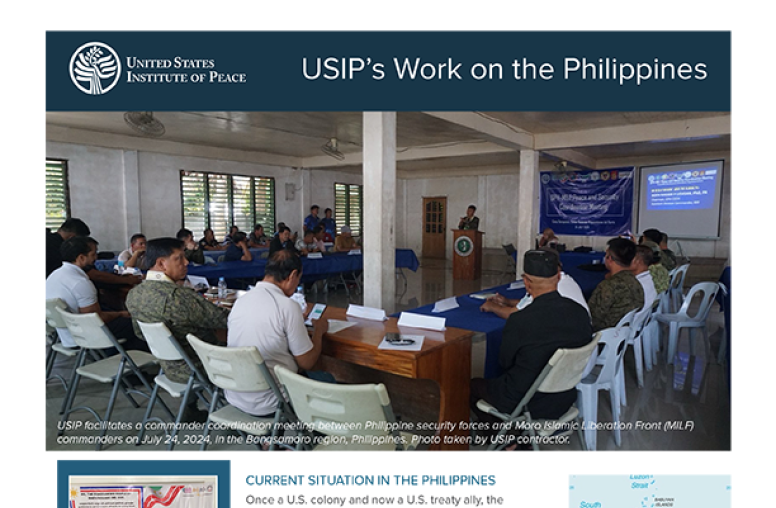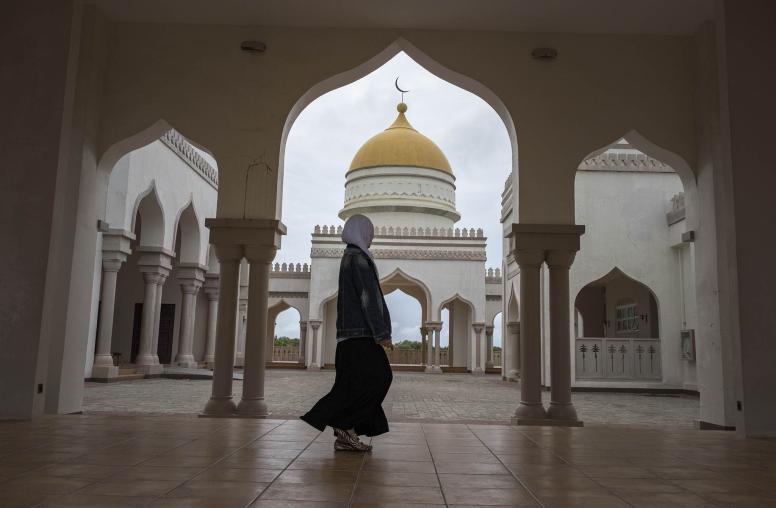Three-Year Bangsamoro Transition Extension Seen as a Critical Opportunity
‘There is a lot of work to be done and a lot of improvements to be made,’ says Bangsamoro Planning and Development Authority director general.
Editor’s Note: Engr. Mohajirin Ali is the director general of the Bangsamoro Planning and Development Authority (BPDA), which coordinates the formulation of the Bangsamoro government’s socioeconomic development policies and plans, and monitors and evaluates those plans. Aliah Adam, who serves as the coordinator for local NGO Singanen O Mindanao and as a consultant for USIP, recently interviewed Ali to discuss the BPDA’s role, the major achievements of the Bangsamoro Transition Authority and the importance of the three-year extension of the transition period of the Bangsamoro Autonomous Region of Muslim Mindanao. The following are edited excerpts from the interview.

What is the role of the Bangsamoro Planning and Development Authority?
Ali: The Bangsamoro Planning and Development Authority (BPDA) was established by the Bangsamoro Autonomy Act No. 6, Section 14, Series of 2020, which was enacted by the Bangsamoro Transition Authority (BTA) on December 27, 2019. The BPDA plays an important role as it oversees planning for every aspect of the Bangsamoro Autonomous Region of Muslim Mindanao (BARMM).
Besides planning, we assess and identify challenges before developing a strategy to mitigate them. We guide agencies and ministries to develop specific programs and projects based on that strategy. We then monitor and assess these programs and projects after they have been implemented.
What have been the major achievements of the BTA/BARMM in the first three years of the transition?
Ali: The first major achievement was the establishment of the BARMM bureaucracy, which is totally different from the previous (Autonomous Region in Muslim Mindanao) one. It was a huge milestone for us. Even during the pandemic, we kept working to ensure that we set up the bureaucracy, engaged in planning, identified challenges and, eventually, adopted strategies to design programs for our various ministries.
Helping to elevate people out of poverty has been another important achievement of ours. The BARMM reduced poverty incidence from 55.9 percent in 2018 to 39.4 percent as of June 2021, according to the Philippine Statistics Authority. The poverty threshold of the BARMM right now is around 14,000 plus Philippine pesos monthly per individual to survive.
Which aspects of the two-track peace process have been the most disappointing in terms of progress?
Ali: Normalization. Every combatant that decommissions is owed an assistance package worth 1 million pesos (including 100,000 pesos in immediate cash assistance, and non-cash benefits that may include study grants, skills training and social protection based on an individual’s specific needs), but not all have received it. As soon as a combatant is decommissioned, they receive 100,000 pesos, but other basic needs, like housing, that are not included in the assistance package, combatants don’t know where to find it.
Decommissioning is just one aspect of normalization; there are other aspects too that need to begin. These include programs to transform former combatant camps through inclusion, violence prevention, economic empowerment and dialogue; access to legal identity and social services; and delivery of essential services in Marawi [which was devastated by the 2017 Marawi City siege]. Decommissioning is moving fast compared to these other areas.
Normalization is about normalizing the Bangsamoro community. We must think of normalization as more than just decommissioning or else there will be an imbalance, and normalcy will not be achieved.
Can the block grant (the annual share of national internal revenue collections appropriated to the BARMM government) be used to help fund normalization?
Ali: Definitely not. Principally, the national government must enumerate what it can support before the BARMM comes in and shares that burden. The peace agreement is clear that the national government is the principal source of funds for normalization. If they pass on this, then we are in a very difficult position. We could find other ways to support normalization; for example, by providing housing.
Why was the transition extension important?
Ali: It was important for very practical reasons. We lost one whole year, the year 2020, because of the pandemic. If the transition was not extended, we basically would have had only 2021 and, at best, a few months in 2022 to accomplish the commitments made in the 2014 peace agreement. Who can establish a government in that short a time? Now we have three more years. Of course, the president and his administration will be crucial to our success.
What are the major challenges and opportunities facing the BTA/BARMM through the three-year extension?
Ali: One of the major challenges relates to the LGUs [local government units]. When they do not cooperate, the delivery of services and support on the ground is slow. That is a major challenge that we face.
Internally, in the BARMM, our plan is to fully establish the bureaucracy and make it capable at all levels. But there is a lot of work to be done and a lot of improvements to be made. For example, we need help to improve public capacity related to finance, planning, procurement and implementation.
How would you assess the president’s approach to peace in the Bangsamoro?
Ali: It is generally okay. His decision to sustain gains in the BARMM is crucial. The success of the peace agreement depends as much on the national government as the MILF [Moro Islamic Liberation Front]. It is good that he has chosen the higher interest of peace in the region and nation rather than short-term political interests.
But on the other aspects of the peace process, especially normalization, there needs to be concrete action. The reappointment of Carlito G. Galvez, Jr. as secretary of OPAPRU [Office of the Presidential Adviser on Peace, Reconciliation and Unity] will hopefully pave the way for positive actions in the future.



